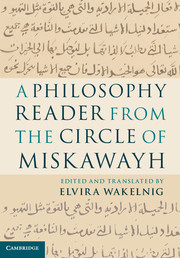Introduction
Published online by Cambridge University Press: 30 September 2021
Summary
Marsh 539: a philosophy reader
The present volume contains the first complete edition of the Arabic text preserved in the Oxford manuscript, Bodleian, Marsh 539. The manuscript was first mentioned in Rosenthal's 1940 article ‘On the Knowledge of Plato's Philosophy in the Islamic World’ because of its excerpts from the Platonic Leges and the three proofs for the immortality of the soul. In a further three-part article, entitled ‘Aš- Šayḫ al-Yûnânî and the Arabic Plotinus Source', Rosenthal identified excerpts in the Marsh manuscript which are attributed to the ‘Greek Sage’ as an important witness to the Arabic Plotinus Source. Since then, the Greek Sage has attracted the attention of a number of scholars, but until recently no attempt was undertaken to study the Marsh manuscript in its entirety. The first step towards such a study was taken by Cottrell in her article ‘L'Anonyme d'Oxford (Bodleian Or. Marsh 539): bibliothèque ou commentaire?'. The present volume hopes to be a second step in the same direction as it puts at the disposal of the scholarly community the complete Arabic text of the Marsh manuscript together with an English translation and a commentary which primarily aims at providing some context for the broad variety of texts and topics gathered in the manuscript. This should provide a basis for further research on the Marsh manuscript in its entirety as well as on the Arabic Plotinus, since some of the Marsh manuscript's material of the Greek Sage has so far been only available in Lewis’ English translation, published in the Henry-Schwyzer edition of the Enneades.
The Marsh manuscript is incomplete at the beginning and the end, and therefore offers no indication of its title, author or composition date. The question arises as to how much textual loss the manuscript has suffered. Since no other manuscript copy of the text has surfaced so far, any information must be gained from an analysis of the text itself.
The text is a compilation of philosophical material taken from various Greek and Arabic authorities quoted either by name or anonymously. The exact sources are indicated only in a few cases.
- Type
- Chapter
- Information
- A Philosophy Reader from the Circle of MiskawayhText, Translation and Commentary, pp. 1 - 62Publisher: Cambridge University PressPrint publication year: 2014

